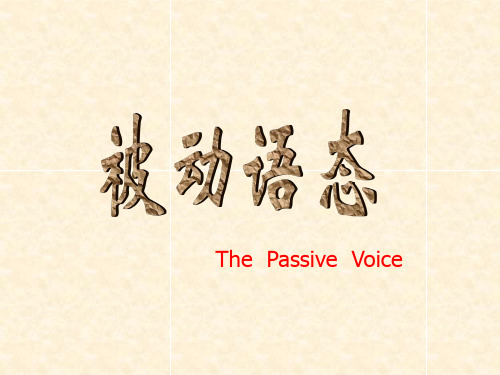被动语态的八大时态 ppt课件
合集下载
《被动语态》PPT课件

疑问形式
Have/Has + 主语 + been + 动词过 去分词 + 其他
特殊疑问句
特殊疑问词 + 一般疑问句
03
特殊情况下的被动语态应用
带情态动词的被动语态
情态动词+be+过去分词
表示对现在或将来的被动动作,如“The work must be finished by tomorrow.”(这项工作必须在明天之前完成)。
在被动语态中,谓语动词要与主语保持一致。当主语是单数第
三人称时,谓语动词要用单数形式。
时态错误问题
错误示例
The house has been built last year.
纠正方法
将has been built改为was built ,即The house was built last
year.
04
改错
The book sells well.(去掉is selling ,改为一般现在时)
06
改错
The house has been being built for two years.(将is being built改为has been being built,表示持续进行的动作)
答案及解析
一般过去时表示过去某一时间发生的动作。 • 去掉is selling,改为一般现在时。因为sell可用作及物动词,也可用作不及物动词。用作及物动词时表示卖的
具体动作,其主语是人;用作不及物动词时表示主语的特征或状态,其主语通常是物。此处表达的是书的特点 ,应该用一般现在时的主动语态。 • 将is being built改为has been being built。因为时间状语now for two years表示到目前为止已经持续了两 年的动作,所以应该用现在完成进行时的被动语态。
各大时态的被动语态讲解ppt课件

归纳总结方法
把主动语态变为被动语态可按“一变、二套、三注意”来进行。 即: 一变---把主动语态的宾语改为被动语态的主语,把主动语态的主语 改为被动语态的介词by的宾语。 二套---根据原句的时态套用相应的时态。 三注意---注意人称的变化而引起的主谓一致问题。 例如: Many people speak English. English by many people. He washed his shoes yesterday. His shoes by him yesterday.
1.He can take care of the baby. 2.Lucy may draw the pictures. 3.You must turn off the lights. 4.They should learn English well. 5.Jim could do it yesterday.
He looked after the little baby yesterday.
主
谓
宾(受动者)
The little baby
was looked after
by
him
yesterday .
They built the tall building last year. He took good care of his little brother yesterday. We cleaned our classroom just now. They used this room for resting. They planted many trees years ago.
We have made twenty more keys.
Twenty more keys have been made by us. 现在完成时: S+ have/has + been+过去分词
把主动语态变为被动语态可按“一变、二套、三注意”来进行。 即: 一变---把主动语态的宾语改为被动语态的主语,把主动语态的主语 改为被动语态的介词by的宾语。 二套---根据原句的时态套用相应的时态。 三注意---注意人称的变化而引起的主谓一致问题。 例如: Many people speak English. English by many people. He washed his shoes yesterday. His shoes by him yesterday.
1.He can take care of the baby. 2.Lucy may draw the pictures. 3.You must turn off the lights. 4.They should learn English well. 5.Jim could do it yesterday.
He looked after the little baby yesterday.
主
谓
宾(受动者)
The little baby
was looked after
by
him
yesterday .
They built the tall building last year. He took good care of his little brother yesterday. We cleaned our classroom just now. They used this room for resting. They planted many trees years ago.
We have made twenty more keys.
Twenty more keys have been made by us. 现在完成时: S+ have/has + been+过去分词
被动语态PPT课件

一般过去时
肯定句结构
主语 + was/were + 动词的过去 分词 + 其他成分
否定句结构
主语 + was/were + not + 动词的 过去分词 + 其他成分
疑问句结构
Was/Were + 主语 + 动词的过去分 词 + 其他成分?
一般将来时
01
02
03
肯定句结构
主语 + will be + 动词的 过去分词 + 其他成分
01
当主动句中的宾语在被动句中变为主语时,其后的宾语补足语
相应地变为主语补足语。
保留宾语补足语
02
有些动词的宾语补足语在被动句中保持不变,仍然对主语进行
补充说明。
省略宾语补足语
03
在某些情况下,被动句中的宾语补足语可以省略,不影响句子
的意思。
双宾语句子转化为被动句
双宾语均可变主语
主动句中的两个宾语在被动句中 都可以变为主语,分别构成两个
如何区分被动语态和过去分词作定语 ?
疑难问题解答
01
哪些动词不能用于被动 语态?
02
不及物动词,如 happen, occur等。
03
04
表示状态的系动词,如 be, seem, appear等。
表示归属的动词,如 belong to, consist of 等。
THANKS
感谢观看
在不需要强调动作承受者或避免提及动作执行者的情况下,尽量使用主动语态。
在科技论文、新闻报道等正式文体中,适当使用被动语态可以增加文章的客观性和 正式度,但要避免过度使用。
06
被动语态(共30张PPT)[1]
![被动语态(共30张PPT)[1]](https://img.taocdn.com/s3/m/3448b852b307e87101f69685.png)
These flowers are planted (by Jim).
Exercise
1.许多树被种。 Many trees are planted (by people).
2.那首歌被唱了许多遍了。 The song is sung many times (by people).
三、被动语态的时态
课堂练习 (一)改写句子 1. We plant trees in spring every year. Trees are planted by us in spring every year. _________________ 2. She posted the letter yesterday. The letter was posted by her yesterday. ____________________ 3. Mr Turner gave me a birthday present. I was given _______________a birthday present by Mr Turner. 4. He is drawing a picture. A picture is being drawn by him. _______________________ 5. You may hand in your homework tomorrow. Your homework may be handed in by you tomorrow. ______________________________ 6. She is going to write a letter. __________________________ A letter is going to be written by her.
被动语态ppt课件完整版

一般现在时、过去时、将来时
一般现在时被动语态
am/is/are + 动词过去分词,表示经 常性或习惯性的动作,或与现在事实 相联系的情况。
一般将来时被动语态
will be + 动词过去分词,表示将来某 一时间要发生的动作或存在的状态。
一般过去时被动语态
was/were + 动词过去分词,表示过 去某一时间发生的动作或存在的状态 。
议上讨论。)
动词形式变化规则
现在进行时
am/is/are being+过去分词。例如:The house is being repaired. (房子正在修理中。)
过去进行时
was/were being+过去分词。例如:He was being operated on when we arrived.(我们到达时他正在接受手术。)
情态动词后接完成式时,有时也可以表示虚拟语气,表示与 过去事实相反的假设或愿望。在这种情况下,句子通常使用 倒装语序,即把情态动词放在主语之前。
05Байду номын сангаас
误用与避免方法探讨
常见误用类型分析
主谓不一致
在被动语态中,主语通常是动作的承受者,谓语应与主语保持一致。然而,有时会出现主 谓不一致的错误,如“The book was wrote by him.”(正确形式应为“The book was written by him.”)
如果不定式前面的名词是对句子的主语的特点进行的说明的时候,使用不定式的主 动语态表示被动含义。
在there be句型中,当动词不定式修饰名词作定语时,不定式用主动式作定语,重 点在人。
动名词作主语或宾语补足语时
动名词作主语时,谓语动词为单数,在动名词和不定式中,作为介词的宾语是动 名词,动名词的否定直接在其前加否定词,通过代词的宾格或所有格形式给出逻 辑主语。
公开课《被动语态》ppt课件

03
was/were done,表示过去某个时间发生的被动动作。
将来时与被动语态结合
将来进行时的被动语态
will be being done,表示“将来某个时间正在被做”的动作。
将来完成时的被动语态
will have been done,表示“将来某个时间之前已经被做”的动 作。
一般将来时的被动语态
will be done,表示将来某个时间要发生的被动动作。
完成时与被动语态结合
现在完成进行时的被动语态
have/has been being done,表示“从过去一直持续到现在并 且还在被做”的动作。
过去完成进行时的被动语态
had been being done,表示“过去的过去一直持续到过去某个 时间并且还在被做”的动作。
疑问句中使用被动语态
疑问句中使用被动语态时,需要将be 动词提前至主语之前,形成疑问语序 。
疑问句中使用被动语态的结构为:Be 动词 + 主语 + 过去分词 + (by + 动 作执行者)?
疑问句中的被动语态同样用来强调动 作的执行者或不需要指出动作的执行 者。
感叹句中使用被动语态
感叹句中使用被动语态时,通常用来 表达对某个动作或状态的强烈感受。
与主动语态对比
01
主动语态
主语是动作的执行者,强调动作的执行者。
02
被动语态
主语是动作的承受者,强调动作的承受者或使宾语变为被动语态的主语,将主动语态的 谓语动词变为被动语态的“be+过去分词”形式。
常见误区及解析
A
误区一
认为所有动词都可以用于被动语态。实际上, 只有及物动词和部分相当于及物动词的动词短 语才能用于被动语态。
被动语态讲解课件

时 态
主动语态
被动语态
1
一般现在时
do/does
am/is/are+过去分词
2
一般过去时
did
was/were+过去分词
3
一般将来时
will+动词原形
will+be+过去分词
4
过去将来时
would+动词原形
would+be+过去分词
5
现在进行时
am/is/are+v-ing
am/is/are+being+过去分词
二、带双宾语的动词有两种改法: 1.把指人的宾语作为被动句的主语. 2.当把直接宾语物作为主语时,要加介词to,for
was bought
was bought
for
pass, show, send…
此类动词有:
buy
be bought for
be given to
此类动词还有:
draw,make, cook, mend
主动句中含有宾语补足语句子的被动语态:把人变为主语
Mother told me not to be late.
I was told not to be late by mother.
I saw mother planting flowers in the garden.
Mother was seen planting flowers in the garden.
can be done
must be planted
should be dug
Can
be put
mustn’t be thrown
高中英语被动语态课件(共16张PPT)

2. 由动词+ 介词或副词构成的短语动词,要把它们作为整体看,即 把它们看成一个及物动词,介词或副词不可拆开或漏掉。这类动词 有: (1)不及物动词+ 介词,如: agree to, ask for, laugh at, operated on, listen to, look after, think of, talk about 等。 The patient is being operated on. The problem is solved. It needn't be talked about. (2)及物动词+ 副词:如:bring about, carry out, find out, give up, hand in, make out, pass on, point out, put away, put off, think over, turn down, work out, turn out 等。 His request was turned down. The sports meet will be put off because of the bad weather.
被动: The price has been brought down.
7. 过去完成时: had + been + given
1) 主动:When I got to the theatre, I found they had already sold out the tickets.
被动:When I got to the theatre, I found the tickets had already been sold out.
动词的过去分词”构成。 1)主动:You must hand in your compositions after
- 1、下载文档前请自行甄别文档内容的完整性,平台不提供额外的编辑、内容补充、找答案等附加服务。
- 2、"仅部分预览"的文档,不可在线预览部分如存在完整性等问题,可反馈申请退款(可完整预览的文档不适用该条件!)。
- 3、如文档侵犯您的权益,请联系客服反馈,我们会尽快为您处理(人工客服工作时间:9:00-18:30)。
过去进行时 was/were +doing
含情态动词 主 + 情态动词 + do
过去完成时 had + done
过去将来时 would +do
被动语态常用的八种时态
1. 一般现在时: People grow rice in the south of the country. Rice is grown in the south of the country. The school doesn't allow us to enter the
time? — Because the workers were
mending the road. Because the road was being
mended. This time last year we were planting
trees here. Trees were being planted here this
school-leavers. Plenty of jobs will be given to
school-leavers.
4. 过去将来时: The manager said they would
complete the project by the end of the year.
The manager said the project would be completed by the end of the year.
一般在下列动词后,间接宾语前用介词 for, 如: buy, cook, choose, fetch, get, ,make, order, 等。 Mother made me a new skirt. (A new skirt was made for me. ) The meat was cooked for us.
4. 带复合宾语(宾语+ 宾补)的动词改为被动语态时,
一般把主动结构中的宾语改为主语,而宾语补足
3. 由动词+ 介词或副词构成的短语动词,要把它们作为整体看,即 把它们看成一个及物动词,介词或副词不可拆开或漏掉这类动词有 laugh at, operate on, look after, make fun of, make use of take care of,, carry out,, give up, hand in, point out, put away, put off, turn down, work out, talk about等。
The workers told me they would mend the car as soon as possible.
The workers told me that the car would be mended as soon as possible.
5. 现在进行时: The radio is broadcasting English
chemistry lab without a teacher. We are not allowed to enter the chemistry lab
without a teacher.
2. 一般过去时: They agreed on the building of a new
car factory last month. The building of a new car factory was
agreed on last month. The student didn't forget his lessons
easily. His lessons were not easily forgotill send cars abroad by sea. Cars will be sent abroad by sea. They will give plenty of jobs to
语态分类
英语动词有两种语态,主动语态和被动语态。主 动语态表示主语是动作的执行者,被动语态表示 主语是动作的承受者。如:
They will build a new bridge over the river. (主动)
A new bridge will be built over the river. (被动)
after class. Your compositions must be handed in
after class. He can write a great many letters with
the computer. A great many letters can be written with
time last year.
7. 现在完成时: Someone has told me the sports
meet might be put off. I have been told the sports meet
might be put off. We have brought down the price. The price has been brought
汉语中常用“被”、“给”、“由”、“受”等 词用来表示被动,而英语用:助动词be + 及物动 词的过去分词构成。
一般现在时 do
-s; -es
一般将来时 will do be to do
be going to do
现在进行时 am/is/are +doing
一般过去时 p.t.
现在完成时 have/has + done
注意:一般在下列动词后,常在间接宾语前用介
词 to,如: bring, give, lend, offer, pass, promise, sell, show, teach, tell 等。
The cup with mixture was showed to the class. My bike was lent to her.
Practice
(1) The police found that the house ____and a lot of things ____D_____. A. has broken into; has been stolen B. had broken into ; had been stolen C. has been broken into; stolen D. had been broken into; stolen
过去完成时 主 +had been + done
现在进行时
过去进行时
主 +am/is/are being 主 + was/were being +
+ done
done
过去将来时 主 + would be + done
说明(1)done表示动词的过去分词(2)下划线的词为助动词
10: 动词不定式的被动语态 1. be to do---- be to be done 2. be going to do---be going to be done 3. be about to do---be about to be done Eg: He is to read a novel.
A novel is to be read by him. They are going to hold a meeting tomorrow. A meeting is going to be held tomorrow. They are about to shoot the murderer. The murderer is about to be shot by them.
the computer by him.
被动语态构成比较
一般现在时
主 + am / is / are + done
一般过去时
主 + was / were + done
含情态动词
主 + 情态动词 + be done
一般将来时 主 + will be + done
现在完成时
主 + have/has been + done
students soon.
A. is about to be discuss
B. is going to be discussed
C. is to discuss
D. is going to have been discussed
(一)语态转换时要注意的问题
1. 把主动语态变为被动语态时,其谓语动词的时态要与原句时态保 持一致,其谓语动词的数要与新主语保持一致。
lessons. English lessons are being
broadcast on the radio. We are painting the rooms. The rooms are being painted (by
us).
6. 过去进行时: — Why didn't they drive there on
We have bought a new computer. A new computer has been bought. (正确) A new computer have been bought. (错误) 2. 含有双宾语的主动句变被动句时,可分别将其中的一个宾语变为 主语,另一个不动,一般变间接宾语为主语时比较多。 My uncle gave me a present on my birthday. I was given a present on my birthday. 保留宾语 如果把直接宾语(指物)改为主语,则在间接宾语(指人)前加适当 的介词,如上句还可以说: A present was given to me yesterday.
含情态动词 主 + 情态动词 + do
过去完成时 had + done
过去将来时 would +do
被动语态常用的八种时态
1. 一般现在时: People grow rice in the south of the country. Rice is grown in the south of the country. The school doesn't allow us to enter the
time? — Because the workers were
mending the road. Because the road was being
mended. This time last year we were planting
trees here. Trees were being planted here this
school-leavers. Plenty of jobs will be given to
school-leavers.
4. 过去将来时: The manager said they would
complete the project by the end of the year.
The manager said the project would be completed by the end of the year.
一般在下列动词后,间接宾语前用介词 for, 如: buy, cook, choose, fetch, get, ,make, order, 等。 Mother made me a new skirt. (A new skirt was made for me. ) The meat was cooked for us.
4. 带复合宾语(宾语+ 宾补)的动词改为被动语态时,
一般把主动结构中的宾语改为主语,而宾语补足
3. 由动词+ 介词或副词构成的短语动词,要把它们作为整体看,即 把它们看成一个及物动词,介词或副词不可拆开或漏掉这类动词有 laugh at, operate on, look after, make fun of, make use of take care of,, carry out,, give up, hand in, point out, put away, put off, turn down, work out, talk about等。
The workers told me they would mend the car as soon as possible.
The workers told me that the car would be mended as soon as possible.
5. 现在进行时: The radio is broadcasting English
chemistry lab without a teacher. We are not allowed to enter the chemistry lab
without a teacher.
2. 一般过去时: They agreed on the building of a new
car factory last month. The building of a new car factory was
agreed on last month. The student didn't forget his lessons
easily. His lessons were not easily forgotill send cars abroad by sea. Cars will be sent abroad by sea. They will give plenty of jobs to
语态分类
英语动词有两种语态,主动语态和被动语态。主 动语态表示主语是动作的执行者,被动语态表示 主语是动作的承受者。如:
They will build a new bridge over the river. (主动)
A new bridge will be built over the river. (被动)
after class. Your compositions must be handed in
after class. He can write a great many letters with
the computer. A great many letters can be written with
time last year.
7. 现在完成时: Someone has told me the sports
meet might be put off. I have been told the sports meet
might be put off. We have brought down the price. The price has been brought
汉语中常用“被”、“给”、“由”、“受”等 词用来表示被动,而英语用:助动词be + 及物动 词的过去分词构成。
一般现在时 do
-s; -es
一般将来时 will do be to do
be going to do
现在进行时 am/is/are +doing
一般过去时 p.t.
现在完成时 have/has + done
注意:一般在下列动词后,常在间接宾语前用介
词 to,如: bring, give, lend, offer, pass, promise, sell, show, teach, tell 等。
The cup with mixture was showed to the class. My bike was lent to her.
Practice
(1) The police found that the house ____and a lot of things ____D_____. A. has broken into; has been stolen B. had broken into ; had been stolen C. has been broken into; stolen D. had been broken into; stolen
过去完成时 主 +had been + done
现在进行时
过去进行时
主 +am/is/are being 主 + was/were being +
+ done
done
过去将来时 主 + would be + done
说明(1)done表示动词的过去分词(2)下划线的词为助动词
10: 动词不定式的被动语态 1. be to do---- be to be done 2. be going to do---be going to be done 3. be about to do---be about to be done Eg: He is to read a novel.
A novel is to be read by him. They are going to hold a meeting tomorrow. A meeting is going to be held tomorrow. They are about to shoot the murderer. The murderer is about to be shot by them.
the computer by him.
被动语态构成比较
一般现在时
主 + am / is / are + done
一般过去时
主 + was / were + done
含情态动词
主 + 情态动词 + be done
一般将来时 主 + will be + done
现在完成时
主 + have/has been + done
students soon.
A. is about to be discuss
B. is going to be discussed
C. is to discuss
D. is going to have been discussed
(一)语态转换时要注意的问题
1. 把主动语态变为被动语态时,其谓语动词的时态要与原句时态保 持一致,其谓语动词的数要与新主语保持一致。
lessons. English lessons are being
broadcast on the radio. We are painting the rooms. The rooms are being painted (by
us).
6. 过去进行时: — Why didn't they drive there on
We have bought a new computer. A new computer has been bought. (正确) A new computer have been bought. (错误) 2. 含有双宾语的主动句变被动句时,可分别将其中的一个宾语变为 主语,另一个不动,一般变间接宾语为主语时比较多。 My uncle gave me a present on my birthday. I was given a present on my birthday. 保留宾语 如果把直接宾语(指物)改为主语,则在间接宾语(指人)前加适当 的介词,如上句还可以说: A present was given to me yesterday.
